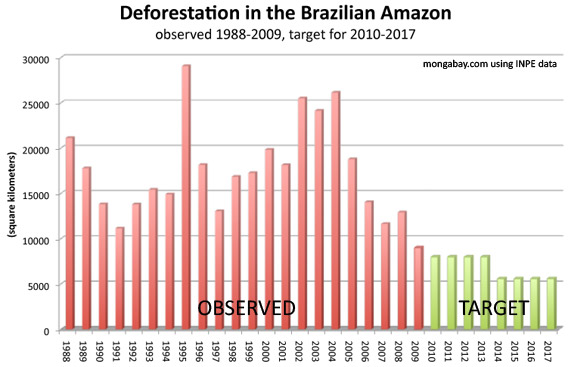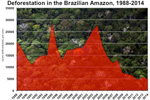Brazil will conditionally support a proposed climate change mitigation scheme that would compensate tropical countries for preserving their forests, reports Reuters.
Speaking at a news conference in Brasilia on Tuesday, Brazil’s Environment Minister Carlos Minc said that Brazil will back the U.N.’s Reducing Emissions from Deforestation and Degradation (REDD) mechanism at December’s climate talks in Copenhagen. But Brazil will push to limit the amount of emissions that an industrialized country can “offset” via REDD to 10 percent of its total emission reduction commitment. Brazil fears that allowing more offsetting would let the world’s largest historical polluters “off the hook” for their emissions from industrial activities while limiting economic growth in developing countries.
 Brazil’s proposed targets for reducing deforestation:
|
“Rich countries still have to do their homework,” Minc was quoted as saying by Reuters.
Brazil aims to reduce its own emissions by 40 percent by 2020 relative to a business-as-usual scenario. If acheived, the country’s emissions in 2020 would be the same as 1994: 1.7 billion tons, or 19 percent below 2005 levels. Roughly half the emissions cuts would come from curbing deforestation in the Amazon. Brazil aims to reduce forest clearing 80 percent from a 1996-2005 baseline of 19,500 sq km (7,528 sq miles) over the next decade. Deforestation accounts for around three-quarters of Brazil’s total CO2 emissions and about 17 percent worldwide.
Related
Concerns over deforestation may drive new approach to cattle ranching in the Amazon

(09/08/2009) While you’re browsing the mall for running shoes, the Amazon rainforest is probably the farthest thing from your mind. Perhaps it shouldn’t be. The globalization of commodity supply chains has created links between consumer products and distant ecosystems like the Amazon. Shoes sold in downtown Manhattan may have been assembled in Vietnam using leather supplied from a Brazilian processor that subcontracted to a rancher in the Amazon. But while demand for these products is currently driving environmental degradation, this connection may also hold the key to slowing the destruction of Earth’s largest rainforest.
Amazon deforestation to fall 30% in 2009

(09/02/2009) Deforestation is the Brazilian Amazon is likely to fall between 8,500 square kilometers (3,088 square miles) and 9,000 sq km (3,474 sq mi) for the 12 months ended July 31, 2009, a reduction of 29-37 percent from last year, reports Brazil’s Environment Minister Carlos Minc. If the estimate is confirmed by high resolution satellite data to be published later this year, the rate of forest loss for 2008-2009 would be the lowest since annual record-keeping began in the 1980s.
Are we on the brink of saving rainforests?

(07/22/2009) Until now saving rainforests seemed like an impossible mission. But the world is now warming to the idea that a proposed solution to help address climate change could offer a new way to unlock the value of forest without cutting it down.Deep in the Brazilian Amazon, members of the Surui tribe are developing a scheme that will reward them for protecting their rainforest home from encroachment by ranchers and illegal loggers. The project, initiated by the Surui themselves, will bring jobs as park guards and deliver health clinics, computers, and schools that will help youths retain traditional knowledge and cultural ties to the forest. Surprisingly, the states of California, Wisconsin and Illinois may finance the endeavor as part of their climate change mitigation programs.
Brazil’s plan to save the Amazon rainforest

(06/02/2009) Accounting for roughly half of tropical deforestation between 2000 and 2005, Brazil is the most important supply-side player when it comes to developing a climate framework that includes reducing emissions from deforestation and forest degradation (REDD). But Brazil’s position on REDD contrasts with proposals put forth by other tropical forest countries, including the Coalition for Rainforest Nations, a negotiating block of 15 countries. Instead of advocating a market-based approach to REDD, where credits generated from forest conservation would be traded between countries, Brazil is calling for a giant fund financed with donations from industrialized nations. Contributors would not be eligible for carbon credits that could be used to meet emission reduction obligations under a binding climate treaty.